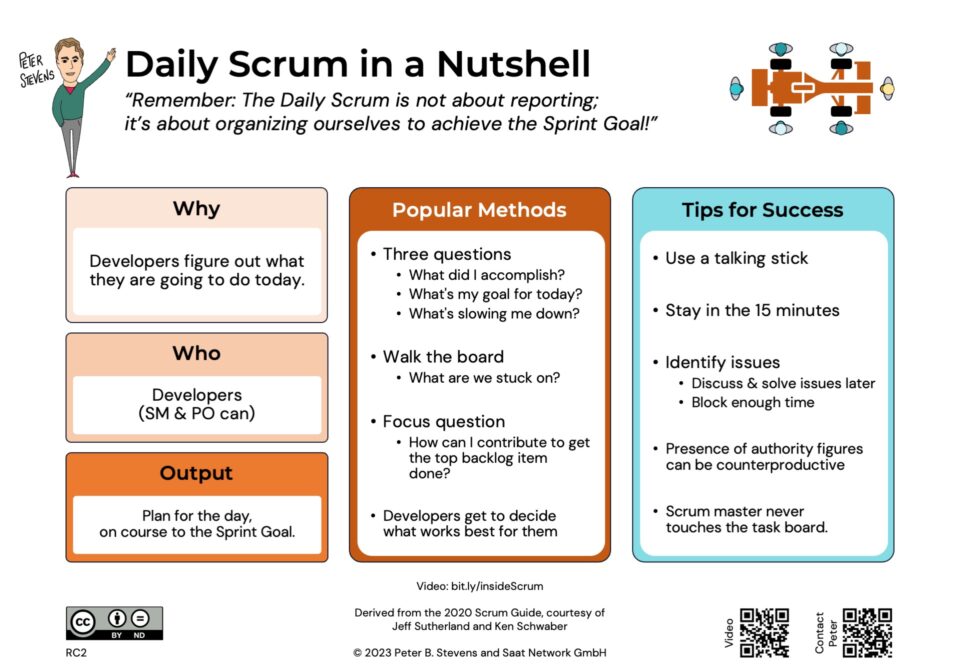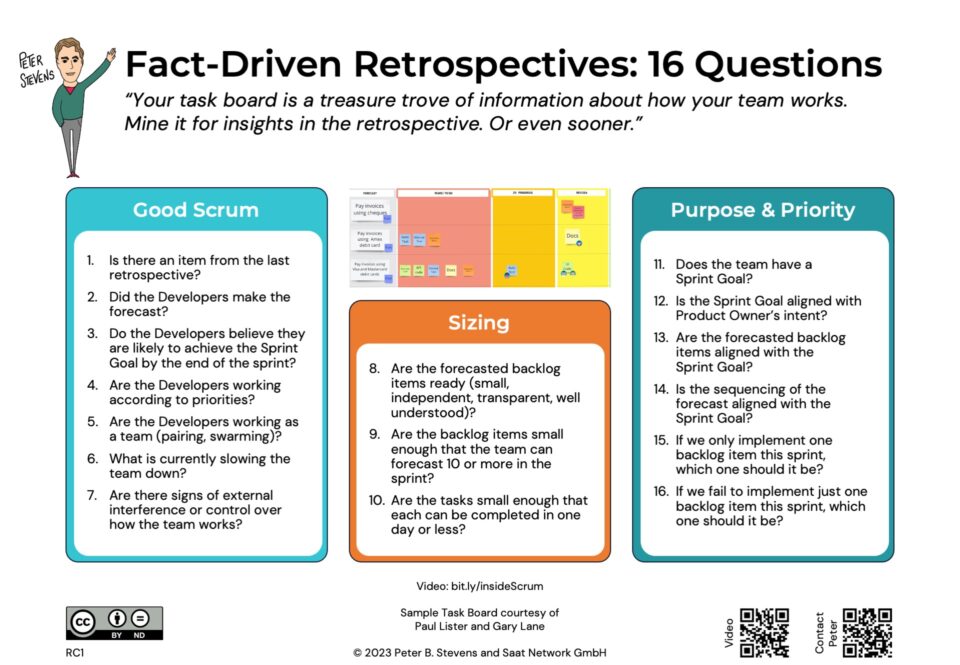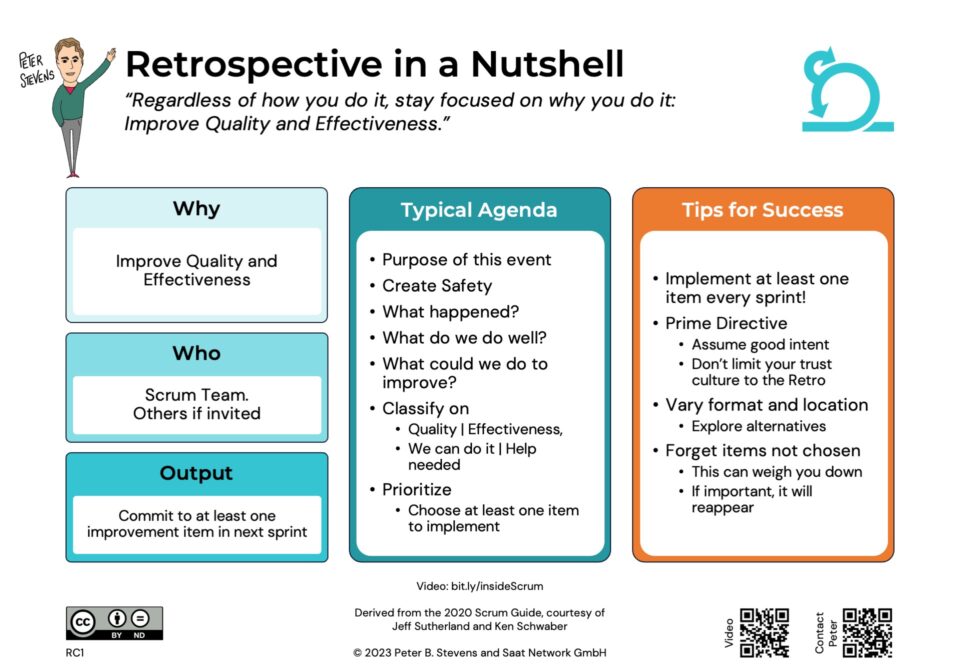When should you apply Scrum?
17-05-2016Looking for an Agile Developer
24-05-2016I have had a lot of great discussions around my post on Personal Scrum, and in the meantime, I have collected some hands-on experience. Four weeks later, what has changed? What’s working well, and what still needs improvement?
What’s gotten better since last month?
- I was ready without drama to go to the Scrum Gathering
- I have published a blog entry every week, something I’ve wanted to do but haven’t done in years.
- I followed up on my courses and Scrum Breakfast Club meetings promptly.
- I succeeded in making a major revision in my CSM materials, something I’ve wanted to do for years. More generally, I am able to set and accomplish medium term goals.
- I pushed back and said no to something that would have been a lot of work and little value.
- I went for a 30 minute walk during the day.
- I have time to waste on youtube and reddit. (Ask me about where we might find life in the solar system or some fan-made Star Trek films worth watching!)
It seems like this is mostly working. This would be a nice time to pat me on the back. Thank you.
What hasn’t gotten better?
I am still working too much on weekends. Perhaps not quite as late into the night. My idea of enlisting my wife as coach/ScrumMaster has not worked the way I’d hoped. She hasn’t had time, sigh. But she got to sing in the Veitsdom in Prague and the KKL in Lucern last weekend, so she can be excused for having other priorities!
I don’t always follow the plan. I have decided this is neither good nor bad, just a fact of life. So I forgive myself for when I don’t follow the plan and celebrate when things go well.
Now, when I plan a goal, I mark it as either moveable or fixed. Movable is light green on the calendar. This is a goal I want to achieve, but whether I do it in the morning, the evening or perhaps even tomorrow, doesn’t make that much difference. I plan around the capacity, not the time slot. Fixed is an appointment with someone or otherwise a hard deadline. In this case, I do plan around the time slot.
What doesn’t really work?
Well, I don’t always work on the items on my schedule, especially not in the order I had planned (thought I often achieve the goals for the day.) What happens when something spontaneous and important arises, like a course registration? Well I do it, even though it wasn’t on the plan. What happens if I am in the middle of something when the allocated time ends? Often I finish it anyway, though this probably needs a break and a reflection before deciding do move on.
What have I learned about myself?
My inspiration was a collection of habits of highly effective people. One recommendation was to manage minutes, not hours. How can people’s lives be so totally predictable? I have planned events with C-level executives of major corporations, and yes, their itineraries were planned down to the minute. As predictable as the machines their companies should be.
Here are some of my key lessons:
- I treat the plan as an attractor, not as a master. When I am wondering what I should do now, I look to my calendar to see what I have planned for the day, not the current minute.
- It is important to celebrate what you did, and not to punish yourself for what you didn’t do.
- My estimates still suck. I am a hopeless optimist.
- Even as I updated my estimates to reflect reality, I noticed something else. Doing the maximum every day that I can is not sustainable. I get tired, my mind starts to drift, and I might find I spend a whole day without even looking at my calendar. There is an important difference between peak performance and sustainable performance.
- In a battle between planning and procrastination, procrastination has the upper hand. (The walk was both a victory and a defeat).
- During periods of high uncertainty or where spontaneity is important, e.g. the Scrum Gathering, I only plan the most important activities and leave lots of time for surprises.
- Planning time is not a replacement for a backlog. I have lost sight of some important goals that I set for myself. I need a trello board.
What will Personal Scrum v.0.2 look like?
- I will have a backlog and a trello board.
- I will review it weekly.
- A coach is on the backlog.
- So are breaks and a sustainable pace and a weekly planning & review cycle.
Inspect and adapt… life goes on.





2 Comments
This is a good article, Have been following it for a month now , even though I have below issues. I would like to here your points on these.
1. I get Random meeting invites on a day to day basis. Which is something out of my control. I have allocated some 'X' hrs for these meetings, but as these are on ad-hoc basis I tend to over-estimate it or sometimes under-estimate it.
2. After these ad-hoc meetings , the follow-up actions which has to be taken is also not predictable. This puts my planned activity on the toss.
At the end of the day, when I do the retrospection I sometimes be disappointed with the deviation b/w ask vs completed items.
The same happens when I try to coach teams also.
And also I am not comfortable in planning into minutes level. As you said how can any one be soo organized. Are we trying to be over-organized over-self here or it is just a theory.
Hi Arpith
Thank your for your insights and concerns.
I am reminded of some relavant quotes. "Respond to change over following a plan". "Planning is invaluable. Plans are worthless."
My challenges are similar to yours! Your comment is actually an example! It came completely unexpected, and I have an important deliverable to produce by tomorrow. I had to make a decision whether or not to respond, and if so when and how much time to allocate. I chose to respond more or less right away, and to limit myself to a 15 minute time-box.
In planning, I make a distinction between movable and unmovable items on my schedule. Moveable items help me remember what is important to me, so I when I ask myself , what do I do now, I can look at my calendar and see what I want to accomplish today. OTOH, if something comes up, I can move them without a guilty conscience.
I leave slack to handle the unexpected, and am experimenting both with scheduling break times and using trello to manage a backlog. I am realizing that sustainability is also an issue.
The goal of time management is becoming clearer to me. I want to make the best use possible of my time. This goal is not to be to be continually in action or to follow exactly what I have planned in the calendar.
Cheers,
Peter